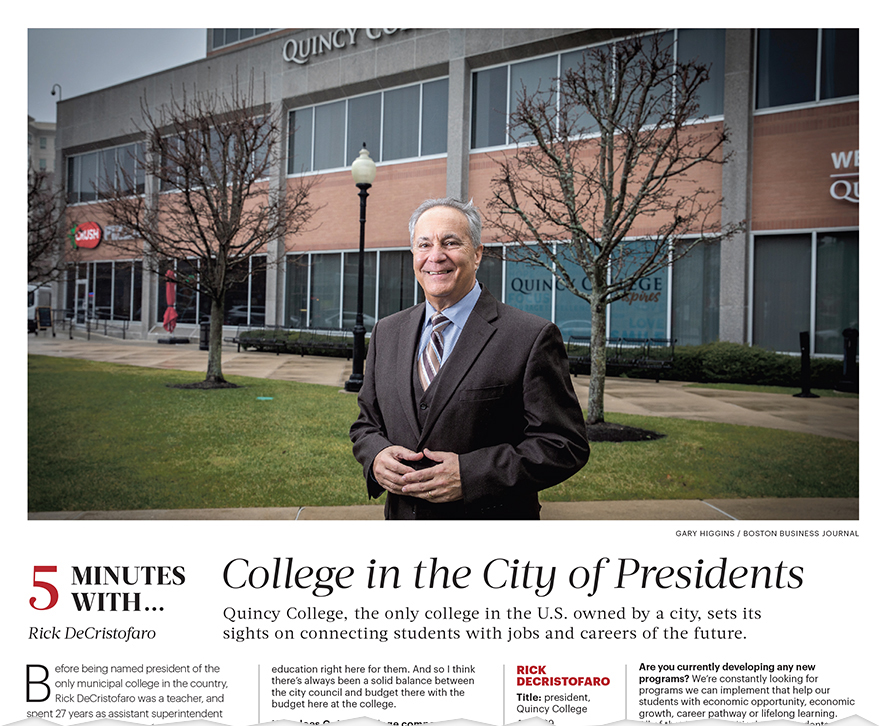
Rick DeCristofaro
Title: President, Quincy College
Age: 69
Education:
B.A. (Elementary Education), North Adams State College, 1974;
M. Ed. Elementary Education, Suffolk University, 1976;
Certificate of Advanced Graduate Study, Boston State College, 1979;
M. Ed. (Special Education), Suffolk University, 1980; Ed. D., UMass Amherst, 1991
Residence: Quincy
Fun Fact: While playing for the Red Sox, he pitched a one-hitter against the Yankees … in Little League.
Before being named president of the only municipal college in the country, Rick DeCristofaro was a teacher and spent 27 years as assistant superintendent and then superintendent of Quincy Public Schools. He has a passion for education and a sense of humor that make him a neat fit for the role, but the move from public school administrator to college president comes with the added responsibility of running a business. Buffeted by the winds of the pandemic, he said enrollment is down, but demand for their two-year degrees and certificate programs remains strong and is expected to grow. DeCristofaro recently answered questions by Business Journal Correspondent Jim Morrison.
What makes Quincy College unique?
It started in 1958 with parents in the city asking for something beyond grade 12 for their kids. They were looking at a community college and then they up with Quincy Junior College. We’re basically owned by the city of Quincy. We see the college and the mayor and the city council as partners and we work together very nicely. There’s been ups and downs with financial times and I think it’s always come out to a really great balance of focusing on the students. Usually, about 20% of our 3,000 of our students are from the city of Quincy. so the city does focus on its own. That’s why the relationship with K-12 here in the city is really so important. We have this pipeline of education right here for them. And so I think there’s always been a solid balance between the city council and budget there with the budget here at the college.
How does Quincy College compare to a community college?
We’re very similar. One difference is, that we don’t get any state funding like community colleges do. And that helps stabilize their budgets. It’s quite different when you have to depend on your enrollment. In real estate, they say “location, location, location” — and I remind people every day, for us, it’s “enrollment, enrollment enrollment” and we’ve got to drive it. So in difficult times, we have to work much harder than other colleges to make sure that we continue to give our students exactly what they need.
How do you balance your role as a business leader and an educator?
We understand that we are a business and that business focuses on our students and whatever programs we have for them, whether it be continuing education or workforce development. Another difference from community colleges is: We have the ability to change and adapt in a way that’s much more focused on our students. We’ve done that within our mission, within our values. We’re constantly looking at our clientele and making sure that we’re meeting their needs. We have the ability now to start our business administration and business management baccalaureate, we’re already started recruiting that first initial cohort of students. Now that’s something obviously the community colleges cannot do.
Are you currently developing any new programs?
We’re constantly looking for programs we can implement that help our students with economic opportunity, economic growth, career pathway, or lifelong learning. All of that is just so critical to the students here — and again, goes back to our culture. We’ve made connections with the SEIU, the National Association of Governmental Employees, FedEx, and the AFL-CIO, with large organizations that need to educate their workforce. We tell them whatever educational programs you need, and let us know. It’s all discounted for the employees and their families. We talk about culture, we talk about community and we talk about making sure that people have the opportunity to be lifelong learners. We are accessible to people and I think that leads to tremendous opportunity for diversity, for English language learners and students of color. First-generation, lower socio-economic students come in here. Our student body is made up of about 46% of students of color.
What is your vision of the future for Quincy College?
I think that both biotechnology and biomanufacturing will be big areas of focus for us. We work with Mass. Life Sciences, and the president, Ken Turner, have been here. He’s looking at us to continue to not only serve students in biotech and biomanufacturing with partners like Thermo Fisher and Moderna and represent that they’re our partners. They’re our hiring partners. So our students in biotech, and biomanufacturing will receive immediate job placement. So we know that that’s a future that we will be increasing that program remarkably, in probably the next two years.